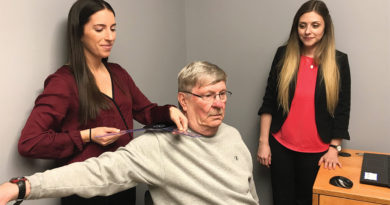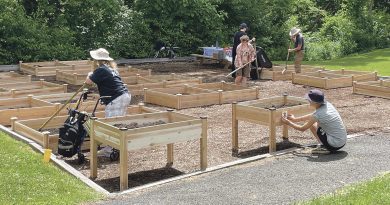Pandemic Has Tested Nursing Students on Every Level Imaginable
Real Learning Experiences
By George O’Brien
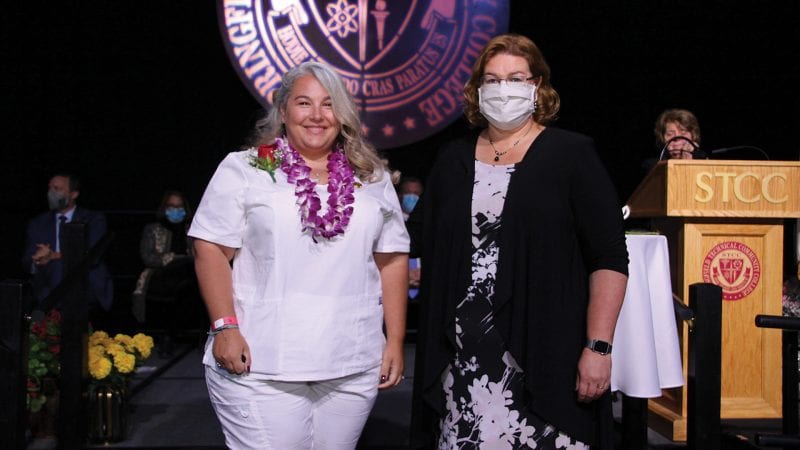
Miranda Lebel has a ton of memories from a nursing education changed by, but ultimately not defined by, the COVID-19 pandemic.
Many of them speak to the challenges that had to be overcome, the manner in which students came together — even when they were forced to be apart — and how those same students found new and different ways to adjust, innovate, and persevere.
And to punctuate all that, Lebel, who recently graduated from Springfield Technical Community College (STCC) and addressed those gathered at the pinning ceremony, flashed back to the many times she had to be tested for COVID so that she could actually be on campus and take part in clinical work at one of the area hospitals.
“When we first started, there wasn’t an easy way to get a COVID test,” she recalled. “I spent time in long lines at the Eastfield Mall, but I used that to my advantage. We had virtual lectures, so I would listen to my lectures while I waited in the car; nursing students are always studying.”
That anecdote relates just some of the myriad ways COVID has changed nursing education, with some of those changes likely to become permanent parts of the landscape, such as virtual programing and even greater use of simulators at area schools. But it only scratches the surface when it comes to conveying the full extent of all the innovating, adapting, and balancing of life, learning, and work, as well as the camaraderie and shared triumph (if that’s the right word) over extreme adversity.
“Our students experienced, in a way that none of us who haven’t been on those front lines can contemplate or know, what the human condition is in the face of a global pandemic.”
And doesn’t fully reflect how, in the minds of the nursing administrators at area schools, the collective experiences of the past 15 months — everything from adjusting to new forms of learning to coping with new challenges, to actually working in hospitals and other settings during the pandemic — might make these students even more job-ready, to use a phrase common in this sector and others.
“Our students experienced, in a way that none of us who haven’t been on those front lines can contemplate or know, what the human condition is in the face of a global pandemic,” said Kathleen Scoble, dean of Nursing at Elms College. “They saw and observed the emotions that healthcare workers were going through, and also patients and family who were separated … these students experienced all that, and I think it enhanced their professional development in a way that other graduates have not had.”
As for the students, those we spoke with said COVID made an already-challenging time in their lives that much more so — and on many levels.
Indeed, while they were balancing school, life, and (for most of them) work before COVID, the pandemic put more balls in the air and the juggling act that much more daunting as they dealt with everything from trying to learn at home (sometimes with young children present) to getting regularly tested for COVID, to trying to keep themselves and everyone around them safe.
Jessica LaFortune, a member of Holyoke Community College’s class of 2021, described the last three of her four semesters in nursing school as a time of constant adjustment, moving from all in-person learning to an all-remote model, then to a hybrid approach her last two semesters.
This adjusting on the fly should serve her well in the ‘real world,’ which will start with a job at Baystate Medical Center in one of its step-down intensive-care units, said LaFortune, adding that her experiences taught her a lot about healthcare and nursing — and even more about herself.
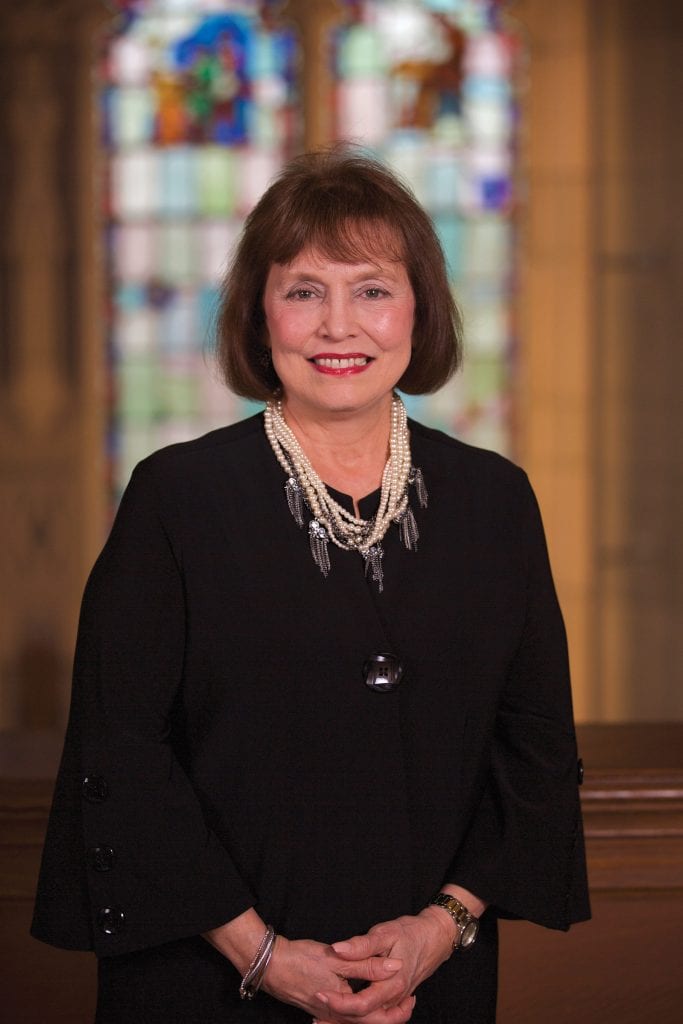
“Making all those adjustments was a challenge, but it pushed me to step up to that challenge,” she explained. “And now I know, going into the field, that any challenge that is thrown at me, whether it be with patients I have or changing within a facility, or anything like that, I know that I can take on that challenge. This experience has given me that confidence.”
Label agreed.
“I saw a change in myself as I progressed through this program, especially with COVID,” she told HCN. “I have two small children; they were home all day, and I had to manage their education while I was trying to manage my own, and I felt that I did so very successfully. And the empowerment that I feel and the change that I feel in my own self-awareness has been more than I ever thought I would get out of an education.
“It truly changed my life,” she went on. “And I really want to thank the faculty because I didn’t know I could do hard things, and now I know I can do hard things, and be very successful.”
Grade Expectations
As they move on from the classroom — and the many forms that word takes — to nursing jobs at area hospitals and other healthcare providers, members of the class of 2021, and those who taught them, know they will be under a microscope of sorts.
“All eyes are on these students,” said Lisa Fugiel, dean of Nursing at STCC, noting that they will be watched because their education was so different from all the nursing classes that came before them, and there are logical questions about whether it was as complete and effective in making students ready for all they will face as they start their career as nurses.
“This group had one semester of normalcy, and the rest of their time was during this pandemic,” she went on. “Everyone will be looking at them; we’re looking at them — we want to see their success with the NCLEX [nursing exam], and providers will be looking at them to see how they transition from academia to practice. We always look at that, and we work together to make sure we’re providing the best education for them to transition well, but obviously, with all these changes, when these students get jobs, their employers will be paying close attention to this group because they want to make sure that they’re transitioning just as easily as past graduates.”
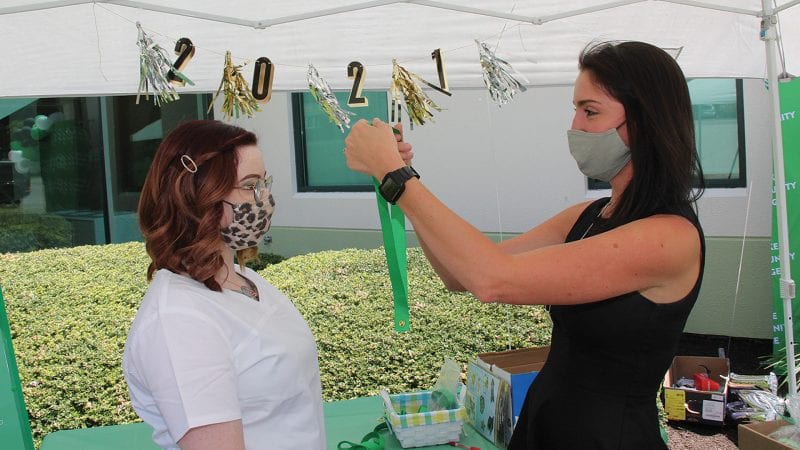
‘Normalcy’ was a word just not heard very often after March 2020. That’s when everything in the broad realm of nursing education changed, and in a profound way. For administrators and teachers, it meant finding new ways students could learn and ultimately prepare themselves for their chosen career. And for those students … it meant two and half semesters of adjusting and, as noted earlier, juggling even more balls.
“Nursing education changed abruptly overnight in the spring of 2020,” Scoble said. “Nursing programs across the nation moved to virtual learning, and clinical experiences were also canceled abruptly as our hospitals, long-term-care facilities, and community agencies — all the affiliates we’re partnered with for our student learning — could no longer take students.”
Elaborating, she said Elms and other schools adjusted to virtual programming and, later, hybrid programming, with the goal of using technology and all available resources to minimize the impact of COVID on a nursing education.
“Now I know, going into the field, that any challenge that is thrown at me, whether it be with patients I have or changing within a facility, or anything like that, I know that I can take on that challenge. This experience has given me that confidence.”
“Even with all the creative solutions, there’s always that question about whether these students would be prepared for professional nursing practice and whether they were receiving the same quality of education,” said Scoble. “We actually believe that we provided our nursing students with not only equivalent learning experiences, but, in some cases, truly enhanced learning.
“We really maximized the use of technology in the classroom, and we also had virtual clinical experiences,” she went on, adding that the goal at Elms was to make the learning experiences as much like hands-on as possible, when hands-on, at least early in the pandemic, was not an option.
Other administrators we spoke with echoed those sentiments.
“There was a lot of learning on the faculty’s part and a lot of learning on the students’ part — new software and new processes as well,” said Fugiel, reflecting on the early weeks and months of the pandemic. “And clinicals changed as well. Our practice partners worked well with us; they did a lot of brainstorming with us, and we were able to move forward with at least 50% direct care, and we got creative with adding other learning activities, such as virtual simulation and on-campus, high-fidelity simulation, vaccine clinics, and long-term-care rotations.”
Teresa Beaudry, director of Nursing at Holyoke Community College, agreed. During the early months of the pandemic, she noted, HCC moved to remote, face-to-face simulations via Zoom, a step up from ‘virtual’ programming.
“Virtual simulation is a student opening a product with no faculty member present, and they do a specific case study; remote is a live simulation where, together, the faculty and students do a simulation as if they were in the building together,” she said — just one example of the creative use of technology to provide students with something approximating hands-on experiences.
And as higher education moves ever closer to something approaching normal, it seems clear that many of the creative solutions found over the past 15 months at area schools will remain part of the learning landscape moving forward as administrators take the best from the pre-pandemic and COVID worlds.
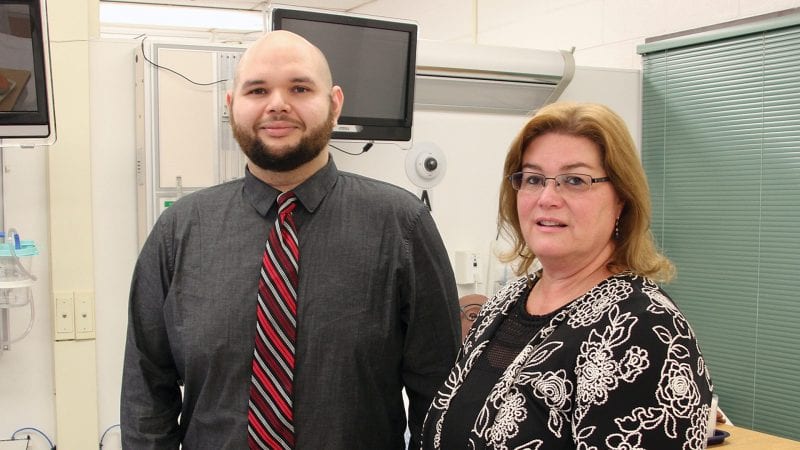
“Stepping back, we’re now able to take a breath, look at what we did, and also decide what we’re going to continue on with,” Fugiel said, “because we’ve certainly identified a lot of these new teaching methodologies as a benefit, and we’re going to continue with some of them.”
Beaudry agreed. Moving forward, she said, some students, especially those with children at home, might prefer the remote, face-to-face learning opportunities, and HCC will likely make them an alternative to in-person offerings.
Put to the Test
As the members of the class of 2021 move from the labs and classrooms to hospitals and other healthcare facilities, there will be obvious and lingering questions about how the COVID-mandated changes to way nursing was taught will impact these graduates’ readiness for the front lines.
Beaudry said the pass rates for the upcoming NCLEX exams might provide some clues, especially if the numbers fall dramatically. But for now, this question of readiness for all that a nursing job will throw at these graduates is a matter of speculation. And those we spoke with are speculating that the collective experiences from the past 15 months are, in many ways, unprecedented and valuable in ways that cannot be easily measured.
“We’ll probably have much to learn from these graduates about the classes of 2020 and 2021, going forward, but I really think that, when we re-entered the clinical environment in the summer and fall of 2020, they witnessed things, and had experiences, that previous students didn’t,” Scoble said. “They saw extraordinary teamwork among nurses, physicians, and other healthcare workers. And they learned a great deal clinically that they would not have learned otherwise given that the pandemic is a historic, unprecedented event.”
“I think this experience made us stronger and better-prepared for what we’re going to face — and it made us stronger as a unit.”
For example, she noted, “they didn’t just learn about things like infection control. They practiced them at an enhanced level.”
Fugiel agreed. “We were leery at first with not having as many direct-care clinical hours, but what we were able to implement, and the varied experiences, have just been a wonderful learning opportunity that students in past classes have not been able to get — things like getting involved in the community, working at a vaccine clinic, and much more,” she said. “And then … the flexibility; nurses have to be flexible, they have to handle change all the time — and these students certainly learned that.”
As for the students, earning a degree while also coping with all that COVID threw at them provided memories (like taking in a virtual lecture while awaiting a COVID test at the Eastfield Mall), but also a head start, if you will, when it comes to taking on challenges, testing themselves in ways they couldn’t have imagined when they first registered for nursing school, and, as Lebel said, doing “hard things.”
In many ways, the experience brought classmates even closer together, said those we spoke with, while also providing meaningful lessons in teamwork and adjusting to changing conditions.
“I think this experience made us stronger and better-prepared for what we’re going to face — and it made us stronger as a unit,” said Kenneth Tanon, another of the recent graduates at STCC. “Even though we weren’t able to see each other, we were able to stay strong and stay united through e-mails and Facebook. If I ever had an issue, I was able to communicate, and I think those skills are very valuable once you’re on a unit.”
Elaborating, he said successfully completing a nursing program has always been a difficult test and means for gaining confidence and self-assuredness. COVID merely added more layers to that equation.
“To get to the end, you have to really want it, and COVID added to that,” he explained. “Without traditional learning, you have to be more self-directed and set the time aside; no one is going to hold your hand. The staff was accommodating and ready to help, but you had to show up and be willing to make the sacrifices that needed to be made.”
Lebel agreed. “I’m working now as an unlicensed nurse, and as soon as I pass my NCLEX, I will be working as a nurse in the same emergency department,” she said. “And those I’m working with truly feel that I’m prepared because I was able to go through this program and adapt and think quickly.”


